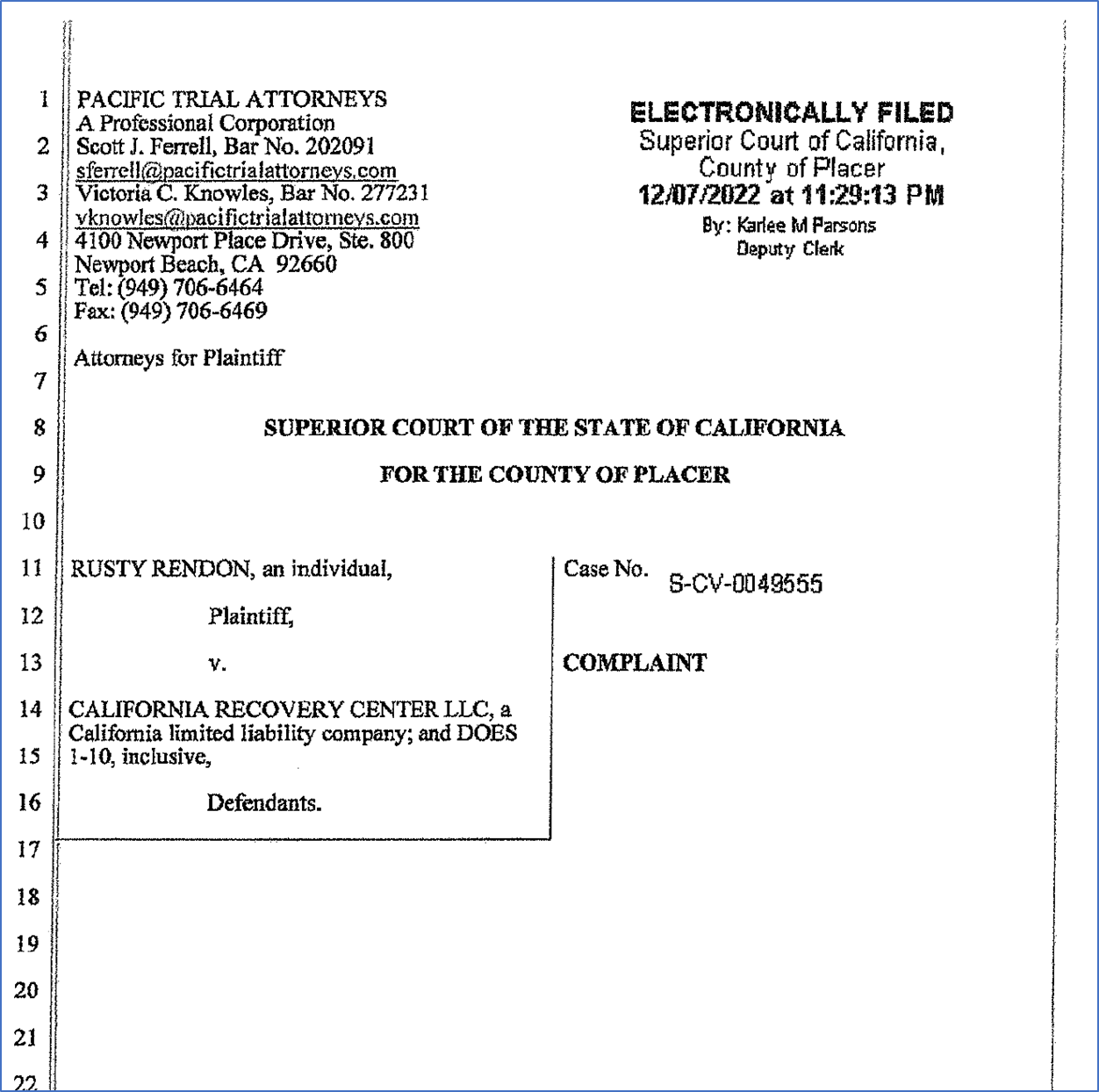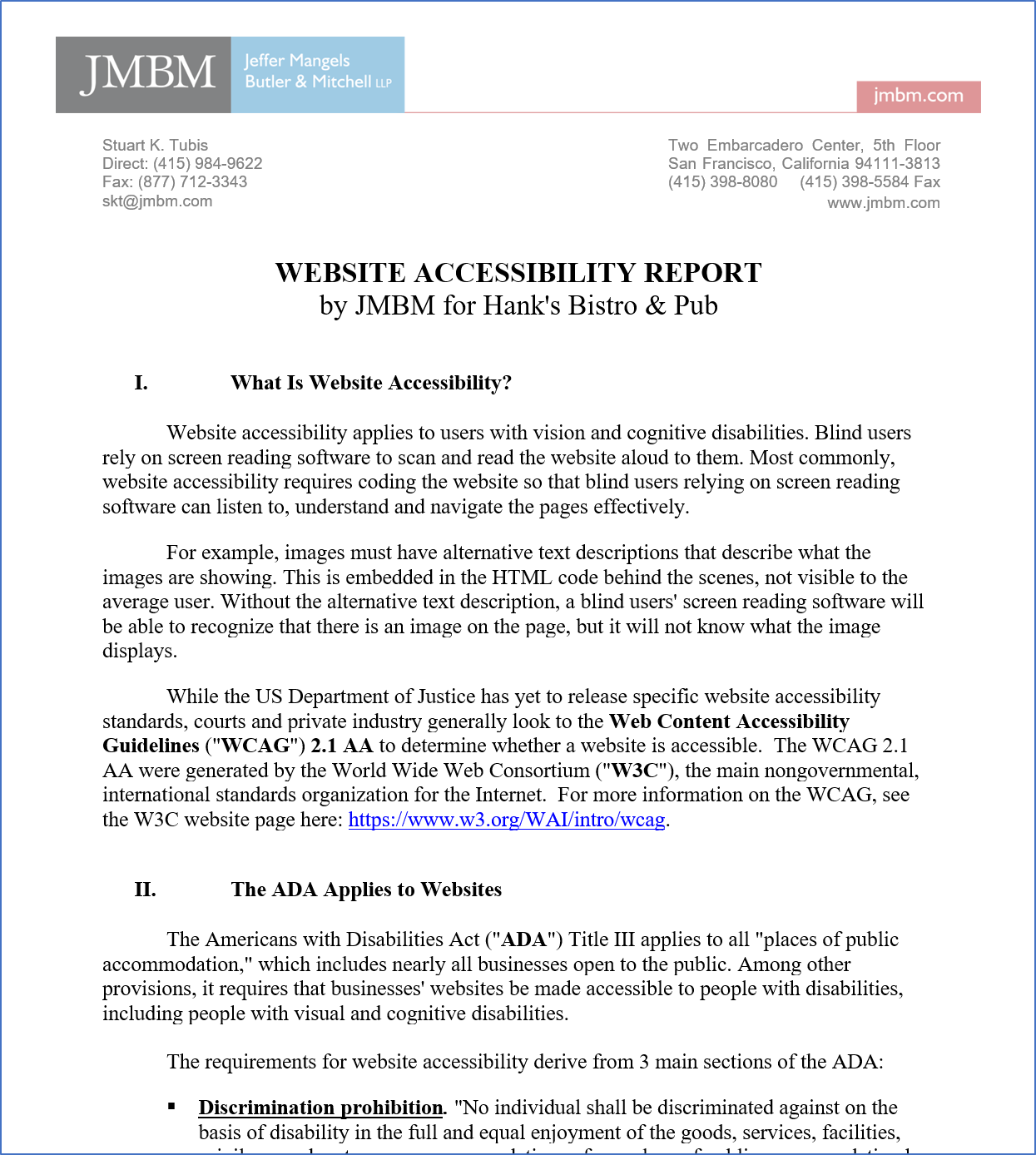By Jim Butler and the Global Hospitality Group®
Hotel Lawyers | Authors of www.HotelLawBlog.com
A recent spate of lawsuits from plaintiffs represented by Pacific Trial Attorneys has highlighted the need for businesses to ensure ADA compliance. In the below article, JMBM partner Stuart Tubis discusses the importance of website compliance, and how best to defend your business if there is liability.
Has Your Business Been Sued by Pacific Trial Attorneys or These Plaintiffs?
How to Defend These Unruh Civil Rights Act Lawsuits
by
Stuart Tubis, JMBM’s ADA Compliance & Defense Group
Pacific Trial Attorneys, as legal counsel, have filed hundreds of lawsuits for alleged violations of the California Unruh Civil Rights Act, California Civil Code § 51 et seq. and/or the Americans with Disabilities Act (ADA).
Based in Newport Beach, CA, Pacific Trial Attorneys is a law firm representing plaintiffs in a large number of accessibility lawsuits against businesses, often focused on website issues.
Generally, these lawsuits are filed by serial plaintiffs through their attorneys. Serial plaintiffs file numerous (sometimes hundreds) of lawsuits, often similar in nature. Pacific Trial Attorneys has historically filed such litigation on behalf of one of these plaintiffs:
- Cheryl Thurston
- Brittany Mejico
- Dominick Martin
- Rusty Rendon
- Luis Licea
- Isabel Rendon
- Drew Hunthausen
- Walter Mitchell
- Anita Ogletree
These lawsuit show no signs of stopping. Each lawsuit includes a summons as a cover page informing you that you have been sued and requiring a response. Next is the complaint itself, which generally looks something like this:
The complaints have often stated in the first paragraph, “As recently recognized by the Supreme Court of the United States, ‘The Internet’s prevalence and power have changed the dynamics of the national economy.’”
It goes on to allege that “Plaintiff is a blind individual who requires screen reading software to read website content arid access the internet. Defendant [Business Name] (‘Defendant’) maintains its website, [Website Address] (the ‘Website’) in such a way that the Website contains numerous access barriers preventing Plaintiff, and other blind and visually-impaired individuals, from gaining equal access to the Website.” See paragraph 4 of the complaint.
Individuals who are blind generally use screen reading software that scans a website page and reads it aloud to them; websites should be coded to be compatible with such software. It is possible the complaint might allege physical accessibility barriers at a retail location, instead of website barriers.
In any event, the first thing you’ll need to do is respond to the complaint within 21 or 30 days, depending on what court it’s filed in. Otherwise, the plaintiff can request a default judgment be entered against you by the court for failure to respond.
Generally, lawsuits by Pacific Trial Attorneys are filed in Superior Court of the State of California, which is state court. In state court, a defendant has 30 days from the date of service (i.e., receiving the complaint) to respond to the complaint. In federal court, the response must be filed within 21 days of service. Many of the lawsuits are filed in Superior Court for the County of Los Angeles but could be filed in other counties in California depending on the facts involved. Generally, responding to the complaint involves filing an answer that either admits or denies the various allegations and asserts relevant affirmative defenses helpful to the case, such as lack of standing or statute of limitations issues.
It might be more prudent, however, to file a motion to dismiss if there are strong defenses. It is important to hire experienced ADA/Unruh counsel to represent you and advise you on the viable defenses for your specific case, such as JMBM’s ADA Compliance and Defense attorneys.
You and your counsel should determine if the claims alleged in the complaint are valid. In other words, is there liability? Some lawsuits lack merit and can be defended or dismissed by the court. See my articles on these topics:
The ADA Does Not Require Website Accessibility Perfection by Stuart Tubis
How To Defend An ADA Or Unruh Lawsuit For Lack Of Standing by Stuart Tubis
California Unruh Civil Rights Act Law Basics by Stuart Tubis
JMBM can review your website for you and tell you whether it complies with the relevant law. The standards that courts generally reference to determine if a website is accessible are the Web Content Accessibility Guidelines (WCAG) 2.1 AA Standards. Generally, we provide a confidential Website Accessibility Report for our clients validating that the website is accessible or providing details and HTML code-level testing of the issues found on the site, as well as advice and guidance on how to make updates if needed. See the example excerpt using a hypothetical business below:
If there is liability, the next step is to explore a possible settlement of the case. The goal of this approach is to negotiate the best terms possible given the facts and circumstances of the case. We always seek to lower the settlement amount for our clients as far as possible, provide plenty of time to update the website, and obtain a full release of liability with complete dismissal of the lawsuit. In settlement negotiations, resolving the lawsuit in the most efficient way possible is the objective.
Stuart K. Tubis is a partner attorney at Jeffer Mangels Butler & Mitchell LLP and a member of JMBM’s ADA Compliance & Defense Group. Stu counsels businesses and landlords on the full spectrum of ADA compliance issues and represents their interests in litigation and Department of Justice investigations. He has a background in technology, which helps in resolving the growing area of website accessibility issues. Contact Stuart K. Tubis at 415.984.9622 or SKT@jmbm.com.




